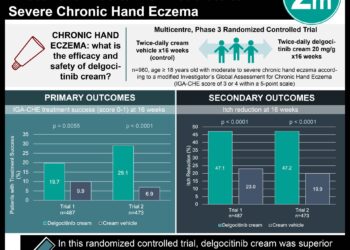Quick Take: Association of Atopic Dermatitis With Sleep Quality in Children
Atopic dermatitis, a common disorder in the pediatric population, is associated with pruritus that is often worse at night and, thus, can interfere with sleep. This longitudinal cohort study aimed to assess whether active atopic dermatitis impacts sleep duration and quality, and to examine the association between severity of disease and these symptoms. Between 1990 and 2008, children (n=13,988) between the ages of 2 and 16 years, with and without active atopic dermatitis, were followed up for self-reported atopic dermatitis severity and self-reported sleep duration and disturbances, such as difficulty falling asleep, early morning awakening, nighttime awakening, and nightmares. Researchers found that there was no clinically significant difference in sleep duration between children with and without active atopic dermatitis, as the average decrease in sleep over all ages for children with active disease was only 2 minutes (95% CI 0 to 4 minutes). However, active atopic dermatitis was associated with an increased risk of sleep disturbance (OR 1.48, 95% CI 1.33 to 1.66). This increased risk of sleep disturbance was more profound among children with more severe atopic dermatitis, rated as “quite bad” or “very bad” (OR 1.68, 95% CI 1.42 to 1.98). A significantly increased risk of sleep disturbance was also found among children with comorbid asthma or allergic rhinitis (OR 1.79, 95% CI 1.54 to 2.09). Investigators therefore concluded that atopic dermatitis is associated with sleep disturbances in childhood, with more severe disease, comorbid asthma and allergic rhinitis contributing to more severe sleep impairment.
Click to read the study JAMA Pediatrics
Image: PD
©2019 2 Minute Medicine, Inc. All rights reserved. No works may be reproduced without expressed written consent from 2 Minute Medicine, Inc. Inquire about licensing here. No article should be construed as medical advice and is not intended as such by the authors or by 2 Minute Medicine, Inc.







